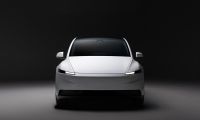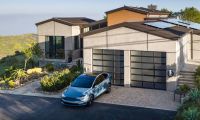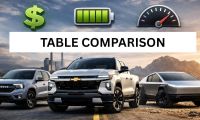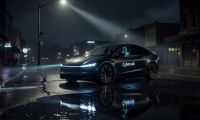Whether Tesla Motors succeeds or fails will be determined by Tesla Model S sales during 2013. On Thursday, two analysts published pieces giving contradictory views of Tesla's chances of success. The MarketWatch analyst claims the company will need significant additional investment to stay afloat, while the GigaOM analyst more-or-less believes Elon Musk's claim that Tesla will turn the corner in 2013, but says there's another risk that could derail the company's chances even if it executes everything else flawlessly.
Tesla Motors has never had a profitable quarter, and instead has been running a steep deficit with the research & development required to design the Tesla Model S and ramp up production suitable for 20,000 cars a year. This has been costly, and at the end of Q3 FY2013 Tesla had cash and short-term securities of $86 million, down from $280 million at the start of the year. Tesla's total current assets were worth $285 million at the end of the third quarter, down 24% from $373 million at the start of 2012. The remaining cash and dwindling assets would put Tesla into bankruptcy, so the company did another round of financing in October which raised $222 million. To make it worse, Tesla's revenue that quarter was down significantly from the same quarter in 2011.
Using these facts the MarketWatch analyst was able to paint an extremely negative picture of Tesla Motors. And, yes, if Tesla's rate of burning cash remains the same it will run out of money at the moment it runs out of investors willing to keep propping up the company.
For this dismal picture to come true, sales of the Tesla Model S will have to remain at a very low rate. Indeed, Tesla's management claims that in 2013 they'll see rapid a revenue increase due to increasing Model S deliveries and sales. Earlier this month Elon Musk tweeted that Tesla had been cash flow positive for a week in November.
Where the MarketWatch analyst ignores increased Model S sales, the GigaOM analyst uses that as a crucial factoid against the MarketWatch analysis.
Musk has consistently claimed since at least last summer, that Tesla would become cash flow positive on only 8,000 unit sales. Last summer when he said this to the shareholders meeting, the company had over 10,000 reservations (a.k.a. deposits) on Model S orders. Since then the Model S has won several prestigious awards (Automobile of the Year, Car of the Year) which should result in even more sales. The company plans are to manufacture 20,000 Model S's in 2013, and preliminary indications are that by the end of 2012 they will reach the 400 car/week manufacturing rate required to produce 20,000 cars/year.
However, there were supply hiccups earlier in 2012 that caused production delays, meaning that Tesla will miss the targeted production of 5,000 Model S's in 2012 and had to slip the production dates for the 60 kilowatt-hour and 40 kilowatt-hour models by a couple months.
That fact causes the GigaOM analyst to point to a different problem. Namely, that Tesla is "a one product company" making it a significant risk from hiccups (or worse) in the supply chain of that one product, the Tesla Model S. The margin of error at Tesla is so thin that a "hiccup" that halts production could derail the company's financial state very quickly.
What about the Federal lifeline? Won't the Obama Administration step in to help, if needed, given that Tesla is one of the darlings of the Obama green technology revolution vision? Tesla has already tapped out the Dept of Energy loans, and is now in a position of beginning to pay back those loans. For the Obama administration to step in with a new loan would likely mean bringing a proposal to Congress, and as in many things Congress seems opposed to Progress, and is unlikely to approve a new loan program. This means Tesla's further need for cash infusions will have to come from private investors, as it should be anyway. If production and sales ramps up as expected, Tesla is looking pretty good with increasing revenue and more stable finances. If there's a hiccup somewhere along the line, things could turn bad.
Sources: MarketWatch, GigaOM
Set as google preferred source











Comments
I visited the Tesla showroom
Permalink
I visited the Tesla showroom twice in the last month and had conflicting answers by two different sales people. One sales person told me the S battery was a Panasonic battery and the other sales person told me the battery for the S was an A123 battery. Then, when I asked how long the battery life was I was told it was 10 years. Electric battery life should be based on cycles, not years. I have looked at a lot of electric vehicles and own one and own three hybrids. When I asked how much a replacement battery would cost she told me $12,000 for the premiere S and that would give me a 300 mile range on a charge and that Elon Musk had even tweeted recently that one owner claimed he got over 400 miles on one charge.. I asked if I bought an S could I get a written guarantee that I could buy a replacement battery in the future for $12,000 and she said NO. I wish reporters would check out how Tesla can get over 400 miles on a charge when comparable batteries for that price can only get 30 miles at most. Tesla should come clean with their battery claims and how it can get mileage at those prices when the competition can't. Tesla is not the only electric manufacturer that uses Panasonic or A123. And, none of the other manufacturers make such an outlandish claim. I think that if you order an S, get your battery replacement prices in writing.
1) Battery brand:
Permalink
In reply to I visited the Tesla showroom by Anonymous (not verified)
1) Battery brand: Wikipedia.org says "Panasonic ."
2) Battery life: My laptop battery dies after 1 year of heavy usage, for others, they last more. For 85 kWh battery, Tesla's site guarantees 8 years / unlimited miles which means you can spend all the cycles you want but only up to 8 years.
3) $12,000 battery Written Guarantee: Yes, but not by old fashion feather ink pen and not on on papyrus. All your purchase paper work including warranties are electronic. Even your signature and Tesla's signature are electronic. They are legally binding and you can print them out on hard paper if you want.
4) 423.5 miles in one charge is real but not practical because there's no speed limit for the autobahns, while in US there are many with it's 70 mph limit posted.
5) Claims: These happen in real life and well documented in real life, not just "claims." Again, all your paper work and signatures, including warranties as mentioned above are in electronic medium for you to print out as hard paper documents.
Reality check: All the pricing and warranties you mentioned are real and legally binding. I need to caution you about the 423.5 miles for one single charge. It was a "competition" and it is not practical. It was real and possible and all details have been widely publicized (googlize "David Metcalf and his son, Adam") with the technique of avoiding climbing mountains and avoiding "high speed." Their speed was mostly 25 to 26 mph and never over 37 mph.
My point was the $12,000
Permalink
In reply to 1) Battery brand: by EV Lover (not verified)
My point was the $12,000 price of the replacement battery package, not whether there was a WRITTEN CONTRACT. Tesla claims the replacement lithium battery package to drive 300 miles costs $12,000.00. If that is true, Tesla would make more money being in the battery business than in the electric vehicle business. Doing some research, talking to battery companies and other electric vehicle OEMs, I just find it hard to understand that their price is 30% - 45% of the cost of comparable battery packages. I was at SEMA and the price of lithium batteries was substantially higher.
You seems to be a Tesla
Permalink
In reply to My point was the $12,000 by Anonymous (not verified)
You seems to be a Tesla doubter.
Historically, when Tesla announces a price, it has always honored its price.
10's of thousands of people started to make deposits before Tesla announced its Model S price. When it did, it stuck to its words and when it wants to change its price, it would give you a warning such as November 29, 2012 announcement on its website (under Enthusiasts--Blog). It warns you if you want the same price, you'll have so much time to be grandfathered.
Thus, I have complete faith that $12,000 price is good until Tesla can be persuaded by your sweet persuasion to increase its price, but even then, it will give me a warning on its website so I can have a chance to be grandfathered.
Now, how can Tesla make money by selling 85 kWh battery for $12,000 in 8 years or the year of 2020?
Do your math! I can think of 2:
1) Go to its website, if you invested $12,000 to buy Tesla stock TSLA at its open at $19.00 on 06/29/2010 for 631.57895 shares, today 12/27/2012, TSLA closes at $33.69, which means you can sell your investment for $21,277.89, that's a profit of $9,277.89 or 77%.
That's only a hold up of your $12,000 for 2.5 years. How much more can you profit when it get a hold of your $12,000 for the next 8 years?
2) New technology price depreciation. It happens to 60" LED, cell phones... It happens in Tesla. The base price for its first model, Roadster, was over $100,000. The base price for its current Model S after 1 year of discontinuation of Roadster is almost half of that. And the Model S can run further and can beat BMW M5 0-60 second drag race!
That's only 1 year! How when you hold on your $12,000 for 8 years, would there any technology price depreciation?
There are many doubters out there, including in the options market. Overwhelmingly, people are short on Tesla (betting that Tesla stock price would go down).
I am no business person, but it has proven its critic over and over again that Tesla's business plan is sensible, believable, credible, and some day profitable (its first positive cash flow was informally tweeted as of 12/03/2012 but you have to wait for its formal filing to SEC to be sure.)
FWIW I wrote the above
Permalink
In reply to I visited the Tesla showroom by Anonymous (not verified)
FWIW I wrote the above drivel. I am a reporter who has built several electric vehicles and knows a thing or two about they work.
The battery cells are made by Panasonic, that is a well known factoid. I believe it is discussed in Tesla's quarterly filings with the SEC, for example. A123 was never in the running to make Tesla's battery cells. The battery pack design and battery management system are Tesla's own technology.
When they tell you "battery life" the sales person is going to be giving a simplified answer. There are a lot of variables to actual battery life, such as the number of charge cycles, the number of times the pack is quick charged, the ambient temperatures, whether you're a lead-foot or not, etc etc etc ... read up on the angst Nissan Leaf owners have because of uncertainty over battery pack capacity loss, and the simplistic information Nissan is telling the public. There are a lot of technical details, however, that I imagine would be very difficult for an automaker to explain to the public.
How did someone get 400 miles range? First, when Tesla's sales person quoted you "300 miles" that's Tesla's number rather than the EPA certification. Second, how an individual would do it is by driving in an efficient manner - such as sslloowwllyy. It's a simple matter of consuming fewer watt-hours per mile, and presto whizzo you get a longer drive. The important measure is the kilowatt-hour capacity of the car. With a vehicle like the Model S it'd be awfully difficult to keep your speed that slow.
As for written guarantee on a replacement battery - unsure what exactly you're looking for. However, the company did recently announce a replacement price for the battery pack. I don't know how iron-clad that is, however. I'd imagine it would be foolish to announce an iron-clad price for a product you'll be buying in 8 years time.